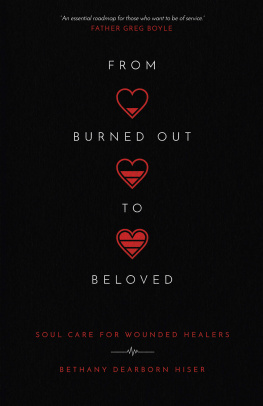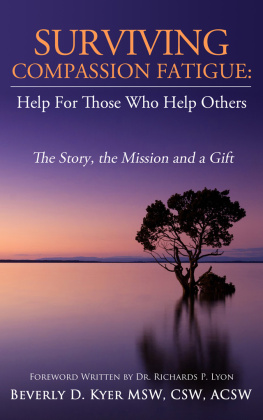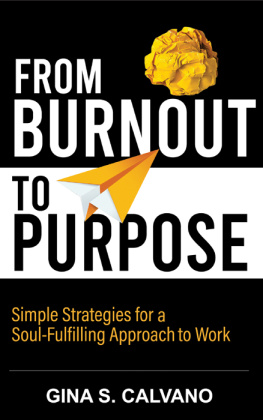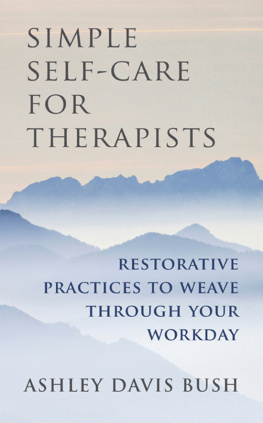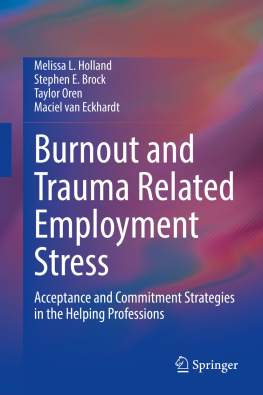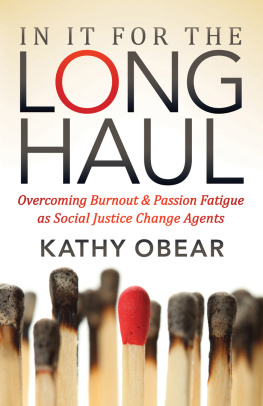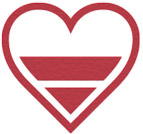Sommaire
Pagination de l'dition papier
Guide
FROM
BURNED OUT
TO
BELOVED
SOUL CARE FOR WOUNDED HEALERS
BETHANY DEARBORN HISER
InterVarsity Press
P.O. Box 1400, Downers Grove, IL 60515-1426
ivpress.com
2020 by Bethany Lynn Dearborn Hiser
All rights reserved. No part of this book may be reproduced in any form without written permission from InterVarsity Press.
InterVarsity Press is the book-publishing division of InterVarsity Christian Fellowship/USA, a movement of students and faculty active on campus at hundreds of universities, colleges, and schools of nursing in the United States of America, and a member movement of the International Fellowship of Evangelical Students. For information about local and regional activities, visit intervarsity.org.
Scripture quotations, unless otherwise noted, are from the New Revised Standard Version Bible, copyright 1989 National Council of the Churches of Christ in the United States of America. Used by permission. All rights reserved worldwide.
While all stories in this book are true, some names and identifying information may have been changed to protect the privacy of individuals.
Photos are by Bethany Dearborn Hiser unless otherwise indicated. All rights reserved.
Stages of Change diagram is Psychology Tools. Reprinted with permission.
Author photo by Hope Black. All rights reserved.
The publisher can't verify the accuracy of website hyperlinks beyond the date of print publication.
Cover design and image composite: Faceout Studio
ISBN 978-0-8308-4796-9 (digital)
ISBN 978-0-8308-4795-2 (print)
This digital document has been produced by Nord Compo.
TO MY BELOVED KENNY
Because of you, this book exists.
Because of you, I am more grounded in my
identity as a beloved one.
INTRODUCTION
Confessions of a Social Justice Workaholic
I used to think self-care was trivial. It was a luxury I didnt need or deserve. I spent my days working with people facing homelessness, abuse, addiction, and incarceration. I felt guilty taking time for myself in the face of so much injustice and poverty and thought my passion for the work would carry me through.
Im not sure exactly when my burnout started. When I look back at journal writings from even the early days of my social-work career, I see signs of despair, exhaustion, misplaced guilt, and inadequacy.
About five years before I burned out, I was working for the first time as a case manager at one of the largest service providers for people experiencing homelessness in downtown Seattle. It was my role to assist the employable homeless in finding housing and employment. Although I had previously volunteered as a mentor in juvenile detention, organized youth service trips in Seattle, and lived and studied in Central America, I was in over my head. I wrote in my journal: I am completely overwhelmed right now. Socked in the stomach, overcome by grief, infuriated at the injustice and disparity that exists in the worldthe absolutely insane violation of peoples basic human rights. I feel like Im not really moving anything forward. Its not enough. When will it ever be enough?
One of my clients, Simon, struggled with depression, alcoholism, diabetes, and suicidal thoughts. Every week I urged him to stay in a shelter. He never did. I didnt blame him. I wouldnt want to sleep in a shelter either. Many shelters in the city were large dorm rooms with twenty-five or more bunkbeds. They were noisy, often chaotic, and sometimes unsafe. Clients had to leave early in the morning and wait in line each night to get in. The lack of privacy and unpredictability alone was dehumanizing and stressful.
Often on cold and rainy evenings, I bused home through the International District, imagining Simon heading to his tent in the rain or snow. His particular struggles weighed on me. I remember arriving home and staring out at the downpour, grieved and worried for Simons well-being, and struck by my inability to do anything to change his situation.
Not long into the job, I started a masters degree in social work. I already knew I was struggling to handle the work, but I thought I just needed more training. For three years, I studied while working two part-time case-management jobs. I simultaneously took classes, researched sex trafficking, managed a drop-in center for migrant farmworkers, and accompanied families as they faced deportation, abuse, and the everyday grind of barely making ends meet. Twice a week, I led domestic-violence support groups and staffed the womens shelter until midnight. I organized a coalition to address local sex trafficking and held monthly meetings for law enforcement professionals, social workers, community leaders, and educators.
There was always more to do. I rarely slowed down, let alone considered vacations. My family spent a week at a nearby cabin each summer, and instead of joining them, I drove down just for an afternoon or maybe an overnight. Then I went back to work. When I took time off, it was to visit organizations working with former sex workers in Thailand and Cambodia.
I didnt give myself permission to play or to do anything solely for fun or relaxation. I only read novels and watched movies that had a globally significant storyline.
I felt that I didnt deserve or couldnt afford to take care of myself in the face of so much suffering. Saying no felt like either a liability or an expression of disdain for the needs of others and for myself.
When I recognized my exhaustion and compassion fatigue, I judged myself. I thought, Who am I to complain? My life is full of blessings that go far beyond my essential needs.
I heard countless stories of trauma directly from survivors as well as time after time from my community. I had very few boundaries and answered calls at all hours. More than once I agreed to go to the hospital for sexual assault calls because I happened to live closer than other staff. I could take it for the team. I thought I was invincible.
My mind began to feel saturated with traumatic realities. Pressing on felt easier than making changes. I also didnt want to stop engaging and advocating for changes. I felt called to the work and grateful for the gift of listening and knowing peoples stories. I wanted to move forward, to move mountains of societal barriers.
Over time my obsession with always doing the work had chipped away at my ability to do the work at all. I didnt yet realize the impact of my internal narratives and belief systems.
Slowly my identity became more and more centered on what I did, rather than who I was. I started to believe that my identity and worth were based on helping others. Worse, I thought I didnt have value as a person unless I was serving people in need. I couldnt stop doing this type of work, because I was called, because I cared, because I was addicted. Beneath my compassion was a driveeven a need for meaning and self-worth.

